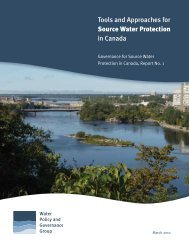Wave Future
Waveof theFuture water policy in western canada - Canada West ...
Waveof theFuture water policy in western canada - Canada West ...
- No tags were found...
You also want an ePaper? Increase the reach of your titles
YUMPU automatically turns print PDFs into web optimized ePapers that Google loves.
wave of the future: water policy in western canada | gibbins & sommerfeld<br />
iv) Interface Between Research and Policy<br />
There was a focus on the interface between research and policy—one of the topics that<br />
dominated the discussion in Saskatchewan. Improving the uptake of scientific and<br />
social research into policy was identified as a challenge that will be key to western Canada’s<br />
place in the country and its economic prosperity over the next 5-10 years. There are<br />
two areas where disconnects lie. First, there is a disconnect between university research<br />
agendas—which are designed to push the frontiers of science—and the policy world,<br />
in which leaders must solve practical problems in short time frames.<br />
Second, there is disconnect between the policy community themselves—the experts—<br />
and decision-makers. Experts highlighted the need to bring comprehensive yet concise<br />
information to the decision-makers. As one individual with a background in politics noted,<br />
for decision-makers, “major, major decisions are coming in front of us and we have about<br />
five minutes to make a decision.” Decision-makers, unfortunately, often do not have the<br />
time to ruminate about the details of each and every issue that comes across their desks. Due<br />
to time constraints, it is imperative that research be clear and easy to understand. It must be<br />
simple and direct. The way to do this is to get more “experts” involved in the decisionmaking<br />
process—not as the person calling the shots, but rather as a valuable resource who<br />
can provide advice, input and guidance on key public policy issues within their area of<br />
expertise. Additionally, decision-makers must have access to improved decision-making tools.<br />
They must make very difficult decisions in short time frames that involve trade-offs. If they<br />
can be equipped with better tools, our experts said, their decisions will be easier to make and<br />
will be better informed. The details, however, of these “tools” were left vague.<br />
what wasn’t talked about<br />
The highlights outlined in this report are an outcome of the various opinions and<br />
experiences of the Roundtable participants. A different group of participants may have<br />
yielded completely different results. With that caveat in mind, it is worth noting that<br />
there was little discussion of the following topics:<br />
> Bulk water exports and/or implications of NAFTA > The water-energy nexus<br />
> Private sector involvement in water services > Water as a human right<br />
> Conservation practices > Municipal water issues<br />
Issues that were touched upon briefly but not discussed in detail included:<br />
> A national water strategy<br />
> Water challenges affecting Canada’s Aboriginal population<br />
What wasn’t talked about was almost as interesting as what was talked about. Often the<br />
issues that dominate media coverage of water include, for example, bulk water exports and<br />
water as a human right. These did not appear to be priority issues for the participants. This<br />
is not to say that these points are not important, as they no doubt are, just simply that they<br />
were not touched upon at any of the four Roundtable discussions.<br />
canada west foundation | www.cwf.ca | august 2011<br />
9




